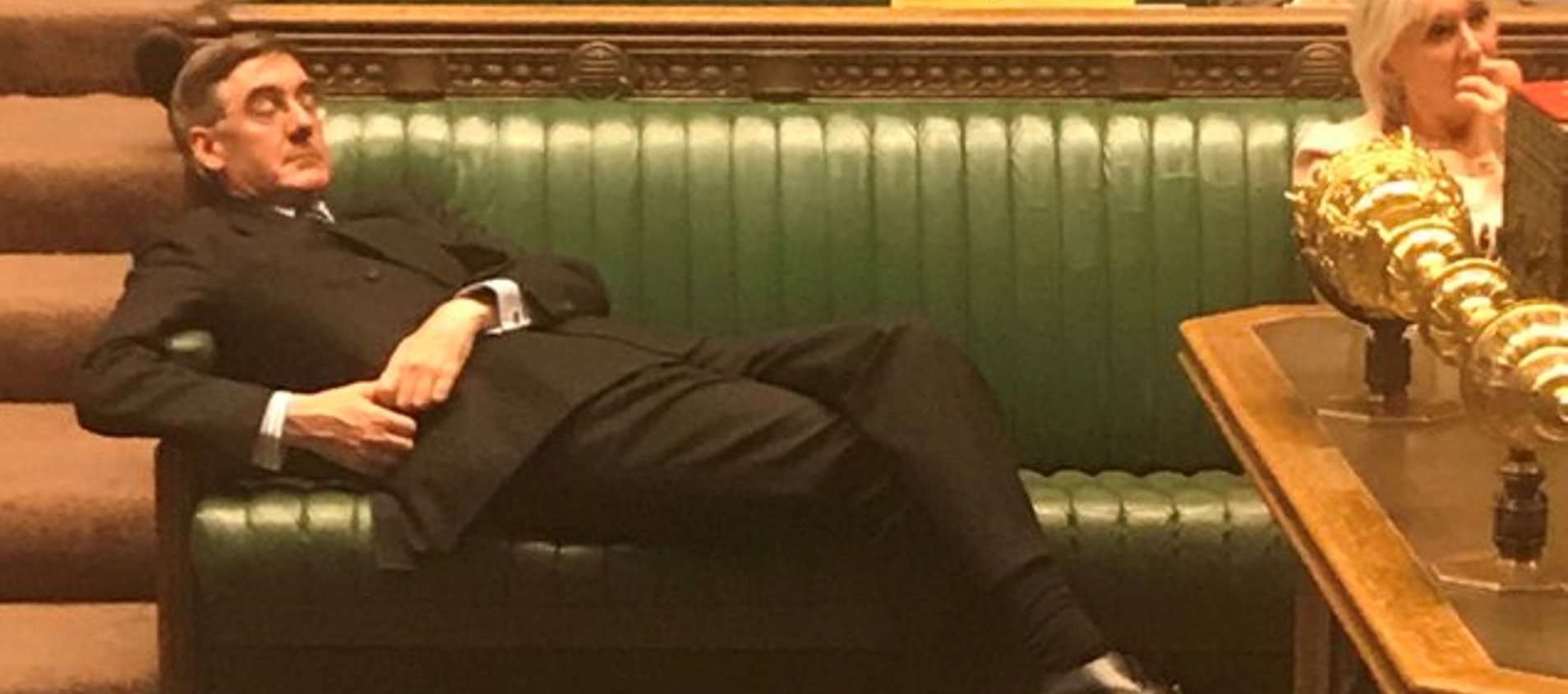Some years ago, it was discovered that Orca whales are feeding upon great white sharks in the most brutally clinical way. They are able to slice open precisely the right spot between the sharks’ pectoral fins, and suck out the liver, leaving the sharks for dead. This was the image that came to mind when watching Boris Johnson face Keir Starmer’s examination at the first few Prime Minister’s Questions. A seemingly powerful political figure, fumbling to respond to the incisive questions of his inquisitor, and ultimately humbled.
Much of this humiliation was put down to the absence of the baying crowd behind Johnson. With the parliamentary chamber reduced to only a few souls, the atmosphere was funereal rather than cacophonous, inhibiting Johnson’s showman character, and playing to Starmer’s courtroom strengths. With this in mind, it is not difficult to see why Jacob Rees-Mogg, the Leader of the House, is so desperate to suspend the virtual parliament and return to business as usual. After this weekend, public confidence has plummeted in the government, and another evisceration from Sir Keir will doubtless see that trend continue.
Such a return raises very real constitutional questions. Setting aside the fact that returning to the chamber has almost certainly required MPs to break the government’s own regulations on social distancing, by the government normal operations may raise questions over the legitimacy of parliament itself – ultimately raising the spectre of judicial intervention once more.
There is no quorum required for parliament to function, no specific number of votes needed for legislation to pass. In ordinary times, this is not an alarming issue. MPs do not need to be present at every vote, they do not need to challenge the government at every debate. But they do need to be able to have the choice to do so. This return to parliament-as-normal removes that choice for some MPs, who are unable to return to the parliamentary estate because they are vulnerable, caring for or living with someone who is vulnerable, or reluctant to break their home country’s guidance, as is the case for Scottish MPs.
Jacob Rees-Mogg claims that the termination of the virtual parliament will enable more effective scrutiny of the government. The temerity of this is remarkable, given that Johnson’s government is more often found running from the merest hint of parliamentary scrutiny. Johnson himself has spent much of his premiership concocting reasons for why he cannot appear before the Liaison Committee, while the most recent amendments to the lockdown regulations have once more been passed without being put before parliament for its consideration. Getting parliament back on normal footing looks more motivated by the need to ensure the government’s inadequate response to questions can be propped up by vociferous partisan support than any real concern over parliamentary function.
Yet Rees-Mogg is right. Virtual parliaments are not as effective at fulfilling their constitutional function. Debates are more laboured and less spontaneous, while many of the invisible elements of parliament, like happenstance meetings in corridors leading to fortuitous discussions, are no longer possible.
For all of these concessions, parliament was still able to function while virtual. Legislation was transparently scrutinised, amended and passed, while select committees could still directly hold their ministers to account. Most crucially, there was no compromise on representation. All MPs were able to continue to represent their constituents, which meant parliament fulfilled its preeminent constitutional function. At time of writing, this will no longer be the case. Robert Halfon, who is shielding on the government’s own advice, told the New Statesman that he was considering coming to vote on an amendment to force the government to maintain the option of virtual voting. This is not a choice any self-respecting democratic government should force its legislators to make, especially when there is a perfectly viable alternative.
For such disenfranchised MPs, now that their amendments have not passed, there may seem little they can do, resigning themselves to the faint hope that public and political pressure will force the government into a u-turn. There is, however, the question of judicial review. In the past, this would have been a quixotic quest. The proceedings of parliament have been protected from judicial scrutiny since the Glorious Revolution, with Article 9 of the Bill of Rights 1689 explicitly prohibiting them from being ‘impeached or questioned in any court’. This would seemingly be the end of the matter. Parliament has decided not to continue with virtual systems, and this decision cannot be reviewed.
However, the primacy of parliament is no longer what it was. The two Miller cases decided by the Supreme Court over Brexit have served to emphasise that the rule of law is just as important a part of the UK constitution as parliamentary sovereignty. In Miller II, the government tried to rely on the aforementioned part of the Bill of Rights in defending its prorogation of parliament, but received short shrift. The Supreme Court justices ruled that the executive proroguing parliament was not, in reality, a decision of parliament, but of the government, and so could be reviewed.
In the substance of their judgment, the justices went onto even more novel constitutional terrain. They struck down the prorogation on the basis that it diminished parliament’s authority, making its sitting dependent on the will of the government- inverting the constitutional hierarchy. However, while the terrain was novel, it was logical. To suggest that parliament is supreme, but can be dismissed by executive fiat, is a paradox.
Should the failure to maintain a virtual parliament be challenged, the claimants would have to rely on similar logic. For parliament to truly sit, it seems obvious that all its members should be able to have a voice and a vote. A parliament that only contains a subset of MPs is not truly representative of the nation- and so not a parliament in any meaningful sense. Consider a hypothetical where a government with an overwhelming majority passed legislation prohibiting MPs from other parties accessing the parliamentary estate. It would be a constitutional outrage, and it would be absurd to see the courts uphold it as a lawful exercise of legislative power.
The courts have occasionally mused upon such limits on parliamentary power. In Moohan v Lord Advocate, Lord Hodge wrote that ‘in the very unlikely event a parliamentary majority abusively sought to entrench its power…the common law, informed by the principles of democracy and the rule of law and international norms, would be able to declare such legislation unlawful’. Similarly, in Jackson, the Law Lords considered the validity of an act of parliament – the Hunting Act 2004. While they ultimately upheld it, Lord Steyn questioned whether there were ‘constitutional fundamentals that even a complaisant House of Commons cannot abolish’, and Lord Hope held that ‘it is no longer correct to say its freedom to legislate admits no qualification whatever’.
In current circumstances, however, it would be surprising for the courts to rule that this was not a properly constituted parliament. A pairing system (albeit one that is alarmingly complex) has been put in place to ensure votes are not affected by the absence of some MPs, and alongside Rees-Mogg’s desire to see the government receive vocal support in the chamber, the motivation for the change seems to be a fear that if the virtual elements of parliament go on for too long, they will become entrenched, rather than anything more sinister. All of this means that while the substitute system may be inadequate and the underlying reasons ridiculous, they are probably enough to just pass constitutional muster. In any event, the convoluted and time-consuming nature of the voting system means it is likely to collapse in upon itself before legal proceedings could even meaningfully begin.
To construct an airport arrivals-style queue in the halls of Westminster Palace, as Rees-Mogg has ordered, does not uphold the dignity of parliament. It makes us, as a nation, look ridiculous, so fearful of the modern world that we force our MPs to risk their health. When this is coupled with the fact that it brings the legitimacy of our democratic system into question, it becomes unjustifiable, teetering on the precipice of illegality. While this issue is not likely to survive long enough to come before the courts, it is to the Supreme Court’s credit that should a government seek to curtail the rights of MPs, it has constructed a framework that will allow it to uphold democratic values and the rule of law in the face of executive overreach.







